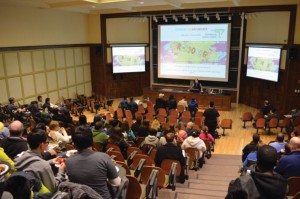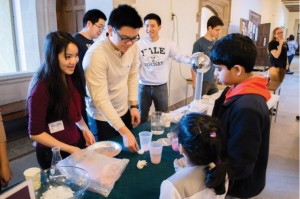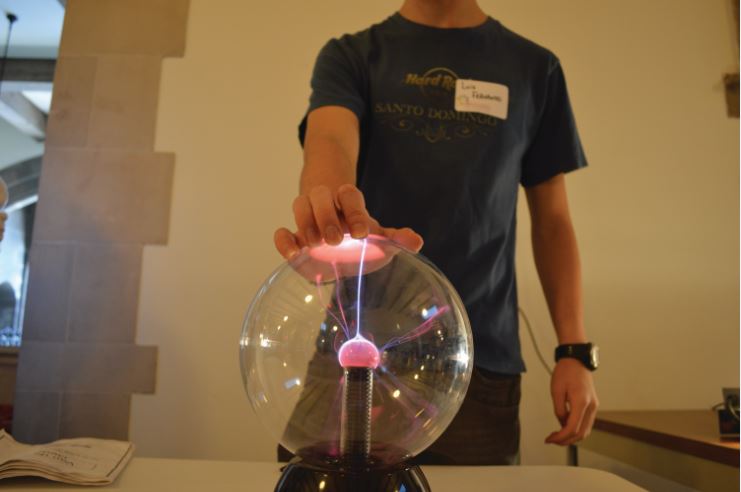Learning science cannot be a passive process. It can be difficult to pick up a textbook and delve straight into the details of a subject, or to try to sort your way through a maze of articles. Ideally, growing scientists should be able to see science in motion, to speak with an experimenter. They should be able to ask questions, and to have those questions answered.
This March marked the 10-year anniversary of an event providing such an outlet for the scientific curiosity of local students and their parents. Run jointly by Yale Synapse, Yale Pathways to Science, and Kurt Zilm, professor of chemistry and chemical engineering, Science on Saturdays takes place on six Saturday mornings every year in the halls of Sterling Chemistry Lab up on Science Hill. There, Yale students perform demonstrations on a wide range of scientific concepts, from microbiology to conservation of momentum. Afterward, visitors take a seat in a lecture hall and hear a presentation from a Yale faculty member, who dives deeper into a topic of his or her expertise.

The demonstrations are interactive and encourage questions and discussion from the students. For example, the spinning chair illustrates an idea in physics that may not be easy to visualize — rotational momentum — and allows visitors to experience it for themselves. The volunteer spins a bicycle wheel around and hands it, still spinning, to a visitor sitting on a swivel chair to hold by the axle. Then, the young scientists holds the wheel sideways, and the changing angular momentum spins her around in her seat. In another demonstration, visitors can use a Van de Graaff generator to create sparks. Still other demos offer students the chance to examine cells from a range of organisms, or to restore the original shape of metal alloys and polymers after bending them into an unrecognizable form.
The speakers cover just as diverse a range of topics. The most recent Science on Saturdays event, and the last of this academic year took place on March 28. The morning included a presentation by Bonnie Fleming, professor of physics. Fleming discussed cutting-edge research in neutrino physics. She explained how neutrinos behave like bandits, only detectable when they hit something that, unlike them, does produce light. She went on to affirm that our understanding of neutrinos is far from complete, and she presented the next questions in her research. Visitors asked questions throughout the presentation and after about this mysterious field of science. “An important thing for kids is hearing about these scientists and how they got to where they are,” Zilm said. Fleming made it a point to mention the relatively small number of women in fields like hers, and encouraged young female visitors in the audience to change that fact.

Science on Saturdays started out small 10 years ago next to Davies Auditorium, run by a tiny group of engineering faculty members. Since then, it has expanded to the more spacious halls of Sterling Chemistry Lab, with Yale graduate and undergraduate students as well as faculty members from a variety of departments coming together to work on each event.
Zilm emphasized the community outreach aspect to Science on Saturdays. “There’s just a need for it in the community,” he said. “People are curious and want to connect.”
Science on Saturdays will start up again next semester. Anyone is welcome to volunteer or attend, and there is no cost or registration. For more information, please visit https://onhsa.yale.edu/science-saturdays.
Cover Image: Science on Saturdays features eye-catching demonstrations. Photo by Suryabrata Dutta.

